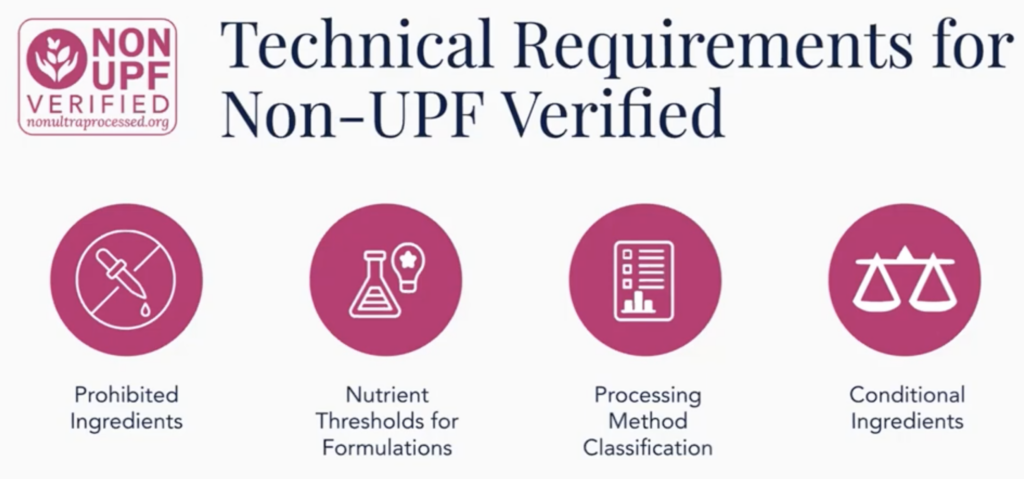A bold step towards food integrity as ultra-processed foods face growing scrutiny
The Non-GMO Project, widely recognised for its butterfly seal on genetically modified organism (GMO)-free products, has launched a pioneering new certification: Non-UPF Verified. Developed under the newly-formed Food Integrity Collective, the label addresses what experts are calling a public health emergency—the overwhelming presence of ultra-processed foods (UPFs) in the modern diet.
With ultra-processed foods (UPFs) dominating public health discourse in 2025, the Non-GMO Project has launched a groundbreaking certification label designed to help consumers steer clear of these controversial products. The new Non-UPF Verified label—introduced under the Food Integrity Collective, a new initiative from the Non-GMO Project—seeks to address what it calls the “pervasive dominance of ultra-processed food” in the modern diet.

Courtesy: Food Integrity Collective/Non-GMO Project
With over 50% of calories in Western diets now coming from UPFs, the initiative seeks to provide consumers with clearer tools to identify and avoid these highly processed food products. The certification marks a significant expansion of the Project’s mission, moving beyond GMOs to take on a broader food systems challenge.
“A Wake-Up Call for Our Food System”
“The standard Western diet has become one of the leading risk factors for death globally,” says the Non-GMO Project and the Food Integrity Collective. “This didn’t happen by chance. When tobacco companies acquired food manufacturers in the 1980s, they used addiction science to develop foods engineered to override satiety and trigger cravings—just like cigarettes.”
The project emphasised that ultra-processing fundamentally alters ingredients to the point where our bodies no longer recognise them as real food. Recent research has linked UPFs to a range of health issues, including hormonal disruption, depression, sleep disturbances, heart disease, obesity, diabetes, and even cancer. Children and adolescents are particularly vulnerable due to their developing brains and nutritional needs.
A Label Built for the Modern Food Landscape
The Non-GMO Project, known for its Non-GMO Verified butterfly logo, has now turned its attention to food processing. The new Non-UPF Verified label promises to provide clarity around foods that avoid excessive industrial processing and the use of additives currently under scrutiny for potential links to metabolic dysfunction, gut microbiome disruption, and other health concerns.
While 85% of Americans surveyed by the Non-GMO Project in 2024 expressed a desire to avoid UPFs, many struggle to do so due to vague definitions and inadequate labelling.
Consumers are navigating an incredibly confusing food environment. Even the most informed shoppers have difficulty consistently identifying what qualifies as ultra-processed.

Courtesy: Food Integrity Collective/Non-GMO Project
To address this gap, the Non-UPF Verified label will apply strict but science-based standards informed by industry experts, public input, and international regulatory policies. These include:
- Evaluation of food processing methods and structural impacts
- Thresholds for ingredient integrity and formulation
- Banned additives—especially those prohibited in California
- Allowance for minimal “micro-ingredients” up to 5% of dry weight, mirroring organic certification standards
The certification also builds on the globally recognised NOVA classification system but seeks to provide more nuance. Critics have argued that NOVA’s broadest category lumps together vastly different products—from fizzy drinks to plant-based meats—under the same “ultra-processed” umbrella.
Over 170 companies have expressed interest in joining the waitlist for the label.
How the Label Works
The Non-GMO Project’s approach draws from the NOVA classification system, a globally recognized model that categorizes food based on processing levels. Most of the pushback about the correlation between UPFs and nutrition/metabolic health is related to how broad NOVA category four is, which is part of what we’re seeking to address, says the project spokeperson.

Courtesy: Food Integrity Collective/Non-GMO Project
The label incorporates several scientific considerations:
- Hyperpalatability: UPFs often combine sugar, oil, and salt in ways that override satiety signals, encouraging overconsumption.
- Erosion of food structure: Industrial processing can disrupt nutrient bioavailability.
- Use of isolated ingredients: Additives may enhance texture or flavor but disconnect the product from whole-food origins.
To strike a balance, the label allows for up to 5% of a product’s dry weight to consist of “micro-ingredients”—small amounts of ultra-processed components not on the banned list. This approach mirrors exceptions in USDA Organic and Non-GMO standards.
A Nuanced Look at Plant-Based Alternatives
One of the biggest questions arising from this new certification: Where do plant-based meats fit in?
Plant-based meat products have frequently landed in hot water due to their classification under NOVA’s UPF category—despite offering significant health and environmental benefits compared to animal-based alternatives. They’ve often been lumped together with heavily processed items like soft drinks and packaged snacks, which critics argue is misleading.
There are definitely things that are ultra-processed and there are examples of things that are not. The pilot program aims to include brands from every major retail category—including those using ingredients like vital wheat gluten—to determine where plant-based meats land under this new framework.
The pilot phase, launching in spring 2025, will include 20 companies across various retail sectors, with over 170 others expressing interest in joining the waitlist. By year-end, the Non-GMO Project aims to finalise the full certification framework, shaped by real-world testing and consumer feedback.
A Turning Point for Transparency
This latest initiative comes amid increasing evidence linking UPFs to chronic illness, with regulatory efforts still lagging. Some experts have called for the classification of “smartly processed foods” to acknowledge products like fortified plant milks and nutritional meat substitutes that offer health benefits despite undergoing processing.
As the pilot unfolds and public feedback is gathered, the Non-GMO Project is expected to release more detailed criteria by the end of 2025. Until then, one thing is clear: the food transparency movement just got a powerful new tool—and it’s stirring up important questions about the future of food.
For more information or to join the pilot programme
Watch their webinar

